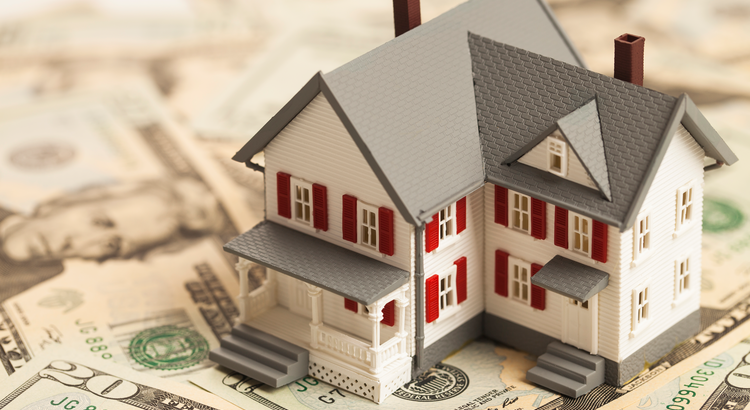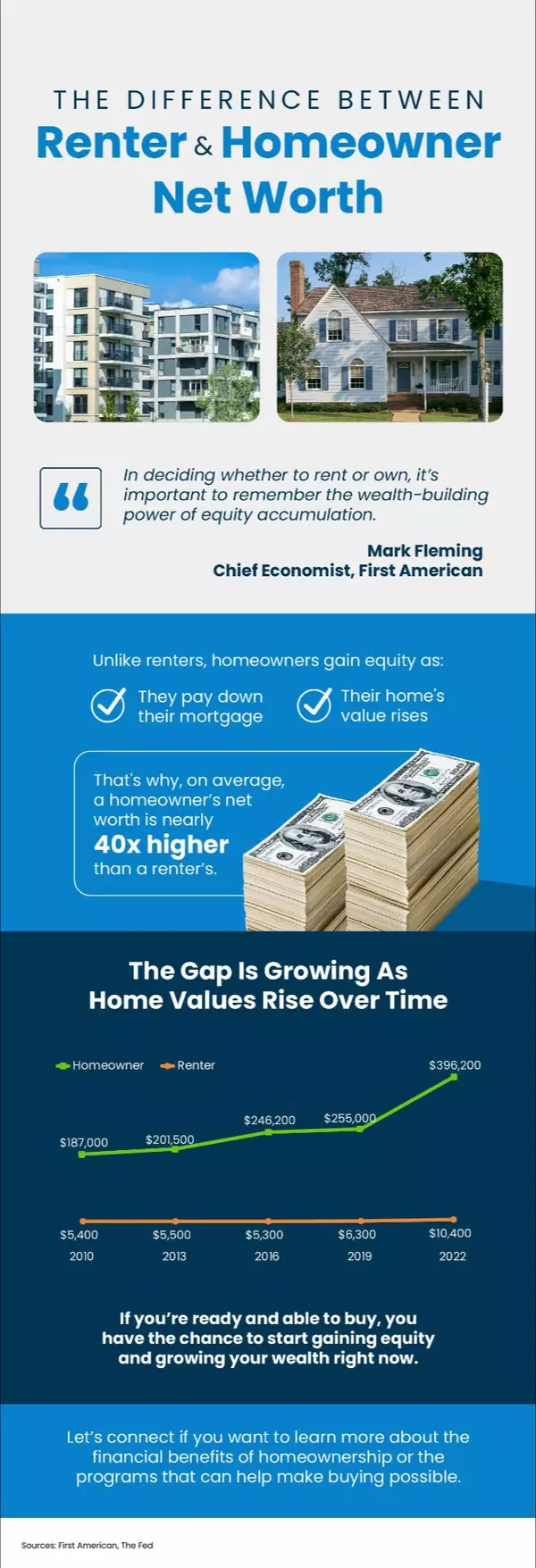2024 Housing Market Forecast [INFOGRAPHIC]
![2024 Housing Market Forecast [INFOGRAPHIC],Isaiah Votaw](https://files.keepingcurrentmatters.com/KeepingCurrentMatters/content/images/20231114/2024-Housing-Market-Forecast-KCM-Share.png)
Some Highlights Thinking of buying or selling a house and wondering what the new year holds for the housing market? Experts forecast home prices to end this year up 2.8% and to rise another 1.5% in 2024. And climbing prices help make homeownership a good investment. Plus, home sales are projected to increase in 2024. That’s good news because it means experts are forecasting more activity as people continue to move. If you're planning to buy or sell, it’s helpful to know what experts project for the housing market. Let’s connect to talk about the latest forecasts and craft a plan together.
Read MorePeople Are Still Moving, Even with Today’s Affordability Challenges

If you're thinking about buying or selling a home, you might have heard that it’s tough right now because mortgage rates are higher than they’ve been over the past few years, and home prices are rising. That much is true. Take a look at the graph below. It breaks down how the current affordability situation stacks up to recent years. The National Association of Realtors (NAR) explains how to read the values on the graph: “To interpret the indices, a value of 100 means that a family with the median income has exactly enough income to qualify for a mortgage on a median-priced home.” The black dotted line represents that 100 value on the index. Essentially, the higher the bar, the more affordable homes are. As you can see, the orange bar for today shows higher mortgage rates and home prices have created a clear challenge. But, while affordability is definitely tighter right now, that doesn’t mean the housing market is at a standstill. According to NAR, based on the pace of sales right now, just under 4 million homes will sell this year. With some simple math, let’s break down what that really means for you: 3.96 million homes divided by 365 days in a year = 10,849 houses sell each day 10,849 divided by 24 hours in a day = 452 houses sell per hour 452 divided by 60 minutes in an hour = about 8 houses sell each minute So, on average, over 10,000 homes sell each day in this country. Whether you're a buyer or a seller, this goes to show there are still ways to make your move possible, even at a time when affordability is tight. An Agent Can Help You Make Your Move a Reality You may be wondering how other homebuyers and sellers are making this happen now. One of the biggest game-changers in today’s market is working with a trusted local real estate agent. Great agents are helping other people just like you navigate today’s market and the current affordability situation, and their insight is invaluable right now. True professionals will be able to offer advice tailored to your specific wants, needs, budget, and more. Not to mention, they’ll also be able to draw on their experience of what’s working for other buyers and sellers right now. This could mean broadening your search, if needed, to include other housing types like condos, townhouses, or neighborhoods a bit further out to help offset some of the affordability challenges today. Bottom Line You might think there aren’t many people buying or selling homes right now since affordability is tighter than it’s been in quite some time, but that’s not the case. It’s true that buying a home has become more expensive over the past couple of years, but people are still moving. If you’re hoping to buy or sell a home today, know that other people are still making their goals a reality – and that’s happening in large part because of the help and advice of skilled local real estate agents. Want to talk to a trusted professional about your own move? Let’s connect.
Read MoreThe Latest 2024 Housing Market Forecast

The new year is right around the corner, and you might be wondering if 2024 will be the right time to buy or sell a home. If you want to make the most informed decision possible, it’s important to know what the experts have to say about what's ahead for the housing market. Spoiler alert: the projections may be better than you think. Here’s why. Experts Forecast Ongoing Home Price Appreciation Take a look at the latest home price forecasts from Fannie Mae, the Mortgage Bankers Association (MBA), and the National Association of Realtors (NAR): As you can see in the orange bars on the left, on average, experts forecast prices will end this year up about 2.8% overall, and increase by another 1.5% by the end of 2024. That’s big news, considering so many people thought prices would crash this year. The truth is, prices didn’t come tumbling way down in 2023, and that’s because there just weren’t enough homes for sale compared to the number of people who wanted or needed to buy them, and that inventory crunch is still very real. This is the general rule of supply and demand, and it continues to put upward pressure on prices as we move into the new year. Looking forward, experts project home prices will continue to rise next year, but not quite as much as they did this year. Even though the expected rise in 2024 isn't as big as in 2023, it's important to understand home price appreciation is cumulative. In simpler terms, this means if the experts are right, according to the national average, after your home's value goes up by 2.8% this year, it should go up by another 1.5% next year. That ongoing price growth is a big part of why owning a home can be a smart decision in the long run. Projections Show Sales Should Increase Slightly Next Year While 2023 hasn’t seen a lot of home sales relative to more normal years in the housing market, experts are forecasting a bit more activity next year. Here’s what those same three organizations project for the rest of this year, and in 2024 (see graph below): While expectations are for just a slight uptick in total sales, improved activity next year is a good thing for the housing market, and for buyers and sellers like you. As people continue to move, that opens up options for hopeful buyers who are looking for a home. So, what do these forecasts show? The housing market is expected to be more active in 2024. That may be in part because there will always be people who need to move. People will get new jobs, have children, get married or divorced – these and other major life changes lead people to move regardless of housing market conditions. That will remain true next year, and for years to come. And if mortgage rates come down, we’ll see even more activity in the housing market. Bottom Line If you’re thinking about buying or selling, it’s important to know what the experts are forecasting for the future of the housing market. When you’re in the know about what’s ahead, you can make the most informed decision possible. Let's chat about the latest forecasts together, and craft a plan for your next move.
Read MoreThese Top Cities Show Home Prices Are Still Climbing

If you’re considering buying a home or selling your current one to find something that better suits your needs, you may have questions about what’s happening with home prices today. Here’s what you need to know. There’s still a lot of confusion and misinformation out there. So, no matter what you may have heard, the national data shows they've actually been climbing again (see graphs below): As you can see, in the first half of 2022, home prices went way up. Those increases were dramatic and unsustainable. So, in the second half of 2022, prices adjusted. Those dips were small and didn't last very long. Still, the news made a big deal about these slight declines, which may have made you worry. But what's important to know is that, in 2023, prices are going up again, and this time it's at a more normal pace. The fact that all three reports now show more typical price increases this year is good news for the housing market. Home Prices Are Rising Across the Top Cities in the U.S. After seeing steady home price growth at the national level for the last several months, you may wonder if prices are going up in your local area, too. Know this: while this will vary from one area to the next, home prices are appreciating in these top cities Case-Shiller reports on in their monthly price index (see chart below): That’s why so many experts are able to forecast home prices will end the year in the positive and continue going up in 2024. Here’s How This Affects You For Buyers: If you've been waiting to buy a home because you were concerned it might lose value, the fact that home prices are going up should ease your worries. Buying a home before prices climb higher can be a smart move since home values typically appreciate over time. For Sellers: If you've been postponing selling your house because you were worried about how changing home prices would affect its value, now might be a good time to work with a real estate agent to put your house on the market. You don't have to wait any longer because the data shows home prices are in your favor. Bottom Line If you delayed moving because you were concerned home prices would drop, don't worry – the numbers show they're going up nationally. To better understand how home prices are changing in your local area, let’s connect.
Read MoreLife-Changing Events That Move the Housing Market

Life is a journey filled with unexpected twists and turns, like the excitement of welcoming a new addition, retiring and starting a new adventure, or the bittersweet feeling of an empty nest. If something like this is changing in your own life, you may be considering buying or selling a house. That’s because through all these life-altering events, there is one common thread—the need to move. Reasons People Still Need To Move Today According to the National Association of Realtors (NAR) there have been a lot of this type of milestone or life change over the last two years (see graph below): And, these big life changes are going to continue to impact people moving forward, even with the current affordability challenges brought on by higher mortgage rates and rising home prices. As Claire Trapasso, Executive News Editor at Realtor.com, says: "Because high mortgage rates, elevated home prices, and stubbornly low inventory make today's housing market particularly challenging, many of today's buyers are motivated by life changes, such as growing families, supporting elderly parents or grown children, or accommodating professional needs. . .” Lean On a Real Estate Professional for Help Whether you're beginning your search for a home or preparing to sell your current house, you don't have to go it alone. With their expertise, a real estate agent is an invaluable partner who can help you smoothly transition through these big moments in your life. Here are just a few examples. When Buying a Home If you’re welcoming a new addition and want more space, the need for a new home may be a top priority. While higher home prices and mortgage rates are creating challenges for buyers, you may have to find a way to meet your changing needs, even with today’s mortgage rates. A skilled real estate agent can help. Their expertise and knowledge of the local housing market can save you a considerable amount of time and stress. An agent will take the time to understand your specific needs, budget, and preferences, allowing them to narrow down your search and present you with suitable options. When Selling a House If you’re retiring or going through a separation or divorce, your main focus may be to make the most out of your investment when selling your house, so you can find one that works better for you moving forward. This is another place where a real estate agent's expertise truly shines. They can accurately assess your home's market value, suggest improvements to enhance its appeal, and craft a strategic marketing plan. Their negotiation skills are a big asset when it comes to making sure you get a fair price for your house, allowing you to move on to the next chapter of your life with confidence and peace of mind. No matter your situation, lean on a trusted professional for help as you buy or sell a home. Bottom Line If recent life-changing events have you wanting or needing to move, let’s connect.
Read MoreIs History Repeating Itself? A Potential Housing Market Surge by 2030

Have you ever wondered if history might hold the key to the future of the housing market? What if I told you that there's a chance the housing market could see a staggering 75% increase by the year 2030? Now, I'm not making any predictions, but it's worth considering the intriguing parallels between today's market and that of the 1980s, rather than the early 2000s. In the late 1970s and early 1980s, inflation ran rampant, and the Federal Reserve was forced to raise borrowing costs. At the same time, the baby boomer generation was reaching the age where they could become first-time homebuyers, much like the current wave of millennials. Notably, a shortage of housing supply was a pressing issue during that period. Comparably, the real estate market was already high and unaffordable back then, prompting people to stay in their existing homes due to the lure of lower interest rates—echoing the current scenario. These parallels make it intriguing to look at the early 1980s as a potential blueprint for what might unfold in the coming years. With this in mind, I decided to delve deeper and research what happened to home prices in the wake of this era. Surprisingly, over the next seven years, there was a remarkable 75% increase in median home prices, lending credibility to the notion that history could, indeed, repeat itself. Moreover, some prominent figures in the investment world are echoing similar sentiments. Real estate experts like Corcoran and financial guru Dave Ramsey are advocating that now might be an excellent time to enter the housing market, provided you have the means to purchase a home. While the future remains uncertain, it's essential to note that personal investment in the housing market can be a wise long-term decision. Furthermore, the current period, with relatively high interest rates, offers a unique advantage—there is less competition than we've seen in the past. This presents an opportunity to find your dream home, live in it for several years, and potentially refinance at more favorable rates when they eventually come down. In conclusion, the similarities between today's housing market and the conditions of the early 1980s are undeniably intriguing. While we can't predict the future, it's wise to consider historical patterns and expert opinions. The housing market might just hold untapped potential for those looking to invest and secure a place to call home in the long run.
Read MoreHomeowner Net Worth Has Skyrocketed

If you’re weighing your options to decide whether it makes more sense to rent or buy a home today, here’s one key data point that could help you feel more confident in making your decision. Every three years, the Federal Reserve Board releases the Survey of Consumer Finances (SCF). That report covers the difference in net worth for both homeowners and renters. Spoiler alert: the gap between the two is significant. The average homeowner’s net worth is almost 40X greater than a renter’s. And here’s the data to prove it (see graph below): The Big Reason Homeowner Net Worth Is So High In the previous version of that report, the net worth of the average homeowner was roughly $255,000 and that of the average renter was $6,300. But in the release that just came out this year, the gap widened as homeowner net worth climbed dramatically. As the Survey of Consumer Finances (SCF) report says: “. . . the 2019-2022 growth in median net worth was the largest three-year increase over the history of the modern SCF, more than double the next-largest one on record.” One of the biggest reasons homeowner net worth skyrocketed is home equity. Over the last few years, known as the ‘unicorn’ years for housing, home prices went through the roof. That’s because there weren’t enough homes for sale, and there was a big influx of buyers rushing to buy them and take advantage of the then record-low mortgage rates. That imbalance of supply and demand pushed prices higher and higher. As a result, most homeowners who had a home during that time saw their equity grow a lot. If you’re still in the middle of making your decision on whether to rent or buy, you may wonder if you missed the boat on the big net worth boost. But here’s what you need to realize. As a recent article in The Ascent explains: “Whether your net worth increased in recent years or not, there are steps you can take to boost that number in the coming years. . . buying a home can be a great way to grow your net worth, since home values have a tendency to rise over time.” Historically, home prices climb over time. Even now that mortgage rates are closer to 7-8%, prices are still rising in many areas of the country because supply is still low compared to demand. That’s why expert forecasts for the next few years call for ongoing appreciation – just at a pace that’s more typical for the housing market. While it likely won’t be the record ramp-up that happened over the last few years, people who buy now should continue to grow equity in the years ahead. That means, if you’re ready and able to buy a home today, you’ll be making an investment that’ll help build your net worth in the long run. As Jessica Lautz, Deputy Chief Economist at the National Association of Realtors (NAR), says: “. . . when deciding to rent vs buy, one must calculate the total cost of homeownership (maintenance, utilities, commuting, etc.) and the total financial benefit. Based on new Fed data . . . the median net worth of homeowners was $396,200 vs renters at $10,400. There is no question about the wealth gains that homeownership provides.” Bottom Line If you’re on the fence about whether to rent or buy a home, remember that homeownership can give your net worth a big boost over time. If you want to learn more about this or the many other benefits of owning a home, let’s connect.
Read MoreThe Benefits of Buying a Multi-Generational Home [INFOGRAPHIC]
![The Benefits of Buying a Multi-Generational Home [INFOGRAPHIC],Isaiah Votaw](https://files.keepingcurrentmatters.com/content/images/20231102/The-Benefits-of-Buying-a-Multi-Generational-Home-KCM-Share.png)
Some Highlights If you’re ready to buy a home but are having a hard time affording it on your own, or, if you have aging loved ones you need to care for, you might want to consider a multi-generational home. Living with siblings, parents, and even grandparents can help you save money, give or receive childcare, and spend quality time together. Let’s connect to find a home in our area that’s perfect for you and your loved one’s needs.
Read MoreReasons To Sell Your House Before the New Year

As the year winds down, you may have decided it's time to make a move and put your house on the market. But should you sell now or wait until January? While it may be tempting to hold off until after the holidays, here are three reasons to make your move before the new year. Get One Step Ahead of Other Sellers Typically, in the residential real estate market, homeowners are less likely to list their houses toward the end of the year. That’s because people get busy around the holidays and sometimes deprioritize selling their house until the start of the new year when their schedules and social calendars calm down. But that gives you an opportunity to get one step ahead. Selling now, while other homeowners may hold off until after the holidays, can help you get a leg up on your competition. Start the process with a real estate agent today so you can get your house on the market before your neighbors do. Get Your House in Front of Eager Buyers Even though the supply of homes for sale did grow compared to last year, it’s still low. That means there aren’t enough homes on the market today. While some buyers may also delay their plans to move until January, others will still need to move for personal reasons or because something in their life has changed. Those buyers are still going to be active later this year and will be seriously motivated to make their move happen because they need to. Unfortunately, the challenge they'll face is a shortage of available inventory to meet their needs. A recent article from Investopedia says: “. . . if your house is up for sale in the winter and someone is looking at it, chances are that person is serious and ready to buy. Anyone shopping for a new home between Thanksgiving and New Year’s is likely going to be a serious buyer. Putting your home on the market at this time of year and attracting a serious buyer can often result in a quicker sale.” Use Your Equity To Fuel Your Move Keep in mind that homeowners today have record amounts of equity. According to CoreLogic, the average amount of equity per mortgage holder has climbed to almost $290,000. That means the equity you have in your house right now could cover some, if not all, of a down payment on the home of your dreams. And as you weigh the reasons to sell before year-end, it's important to remember the reasons that sparked your desire to move in the first place. Maybe it’s time for a new home in a location that suits you better, one that offers the perfect space for you and your loved ones, or maybe your needs have evolved over time. A local real estate agent can help you determine how much home equity you have and how you can use it to achieve your goal of making a move. Bottom Line Listing your home before the new year can offer unique benefits. Less competition, motivated buyers, and your equity gains can all play to your advantage. Reach out, and let's achieve your goals before winter sets in.
Read MoreDon’t Believe Everything You Read About Home Prices

According to the latest data from Fannie Mae, 23% of Americans still think home prices will go down over the next twelve months. But why do roughly 1 in 4 people feel that way? It has a lot to do with all the negative talk about home prices over the past year. Since late 2022, the media has created a lot of fear about a price crash and those concerns are still lingering. You may be hearing people in your own life saying they’re worried about home prices or see on social media that some influencers are saying prices are going to come tumbling down. If you’re someone who still thinks prices are going to fall, ask yourself this: Which is a more reliable place to get your information – clickbait headlines and social media or a trusted expert on the housing market? The answer is simple. Listen to the professionals who specialize in residential real estate. Here’s the latest data you can actually trust. Housing market experts acknowledge that nationally, prices did dip down slightly late last year, but that was short-lived. Data shows prices have already rebounded this year after that slight decline in 2022 (see graph below): But it’s not just Fannie Mae that’s reporting this bounce back. Experts from across the industry are showing it in their data too. And that’s why so many forecasts now project home prices will net positive this year – not negative. The graph below helps prove this point with the latest forecasts from each organization: What’s worth noting is that, just a few short weeks ago, the Fannie Mae forecast was for 3.9% appreciation in 2023. In the forecast that just came out, that projection was updated from 3.9% to 6.7% for the year. This increase goes to show just how confident experts are that home prices will net positive this year. So, if you believe home prices are falling, it may be time to get your insights from the experts instead – and they’re saying prices aren’t falling, they’re climbing. Bottom Line There’s been a lot of misleading information about home prices over the past year. And that’s still having an impact on how people are feeling about the housing market today. But it’s best not to believe everything you hear or read. If you want information you can trust, turn to the real estate experts. Their data shows home prices are on the way back up and will net positive for the year. If you have questions about what’s happening in our local area, let’s connect.
Read MoreWhat Are Accessory Dwelling Units and How Can They Benefit You?

Maybe you’re in the market for a home and are having a hard time finding the right one that fits your budget. Or perhaps you’re already a homeowner in need of extra income or a place for loved ones. Whether as a potential homebuyer or a homeowner with changing needs, accessory dwelling units, or ADUs for short, may be able to help you reach your goals. What Is an ADU? As AARP says: “An ADU is a small residence that shares a single-family lot with a larger, primary dwelling.” “An ADU is an independent, self-contained living space with a kitchen or kitchenette, bathroom and sleeping area.” “An ADU can be located within, attached to, or detached from the main residence. It can be created out of an existing structure (such as a garage) or built anew.” If you're thinking about whether an ADU makes sense for you as a buyer or a homeowner, here's some useful information and benefits that ADUs can provide. Keep in mind, that regulations for ADUs vary based on where you live, so lean on a local real estate professional for more information. The Benefits of ADUs Freddie Mac and the AARP identify some of the best features of ADUs for both buyers and homeowners: Living Close by, But Still Separate: ADUs allow loved ones to live together while having separate spaces. That means you can enjoy each other’s company and help each other out with things like childcare, but also have privacy when needed. If this appeals to you, you may want to consider buying a home with an ADU or adding an ADU onto your house. According to Freddie Mac: “Having an accessory dwelling unit on an existing property has become a popular way for homeowners to offer independent living space to family members.” Aging in Place: Similarly, ADUs allow older people to be close to loved ones who can help them if they need it as they age. It gives them the best of both worlds – independence and support from loved ones. For example, if your parents are getting older and you want them nearby, you may want to buy a home with an ADU or build one onto your existing house. Affordable To Build: Since ADUs are often on the smaller side, they’re typically less expensive to build than larger, standalone homes. Building one can also increase your property’s value. Generating Additional Income: If you own a home with an ADU or if you build an ADU on your land, it can help generate rental income you could use toward your own mortgage payments. It’s worth noting that because an ADU exists on a single-family lot as a secondary dwelling, it typically cannot be sold separately from the primary residence. But that’s changing in some states. Work with a professional to understand your options. These are a few of the reasons why many people who benefit from ADUs think they’re a good idea. As Scott Wild, SVP of Consulting at John Burns Research, says: “It’s gone from a small niche in the market to really a much more impactful part of new housing.” Bottom Line ADUs have some great advantages for buyers and homeowners alike. If you're interested, reach out to a real estate professional who can help you understand local codes and regulations for this type of housing and what’s available in your market.
Read MoreForeclosures and Bankruptcies Won’t Crash the Housing Market

If you've been following the news recently, you might have seen articles about an increase in foreclosures and bankruptcies. That could be making you feel uneasy, especially if you're thinking about buying or selling a house. But the truth is, even though the numbers are going up, the data shows the housing market isn’t headed for a crisis. Foreclosure Activity Rising, but Less Than Headlines Suggest In recent years, the number of foreclosures has been very low. That’s because, in 2020 and 2021, the forbearance program and other relief options were put in place to help many homeowners stay in their homes during that tough time. When the moratorium ended, there was an expected rise in foreclosures. But just because they’re up, that doesn't mean the housing market is in trouble. To help you see how much things have changed since the housing crash in 2008, check out the graph below using research from ATTOM, a property data provider. It looks at properties with a foreclosure filing going all the way back to 2005 to show that there have been fewer foreclosures since the crash. As you can see, foreclosure filings are inching back up to pre-pandemic numbers, but they're still way lower than when the housing market crashed in 2008. And today, the tremendous amount of equity American homeowners have in their homes can help people sell and avoid foreclosure. The Increase in Bankruptcies Isn’t Dramatic Either As you can see below, the financial trouble many industries and small businesses felt during the pandemic didn’t cause a dramatic increase in bankruptcies. Still, the number of bankruptcies has gone up slightly since last year, nearly returning to 2021 levels. But that isn’t cause for alarm. The numbers for 2021 and 2022 were lower than more typical years. That’s in part because the government provided trillions of dollars in aid to individuals and businesses during the pandemic. So, let’s instead focus on the bar for this year and compare it to the bar on the far left (2019). It shows the number of bankruptcies today is still nowhere near where it was before the pandemic. Both of these two factors are reasons why the housing market isn't in danger of crashing. Bottom Line Right now, it's crucial to understand the data. Foreclosures and bankruptcies are rising, but these leading indicators aren’t signaling trouble that would cause another crash.
Read MoreA Real Estate Agent Helps Take the Fear Out of the Market

Do negative headlines and talk on social media have you feeling worried about the housing market? Maybe you’ve even seen or heard something lately that scares you and makes you wonder if you should still buy or sell a home right now. Regrettably, when news in the media isn't easy to understand, it can make people feel scared and unsure. Similarly, negative talk on social media spreads fast and creates fear. As Jason Lewris, Co-Founder and Chief Data Officer at Parcl, says: “In the absence of trustworthy, up-to-date information, real estate decisions are increasingly being driven by fear, uncertainty, and doubt.” But it doesn’t have to be that way. Buying a home is a big decision, and it should be one you feel confident making. You should lean on a trusted real estate agent to help you separate fact from fiction and get the answers you need. That agent will use their knowledge of what’s really happening with home prices, housing supply, expert forecasts, and more to give you the best possible advice. The National Association of Realtors (NAR) explains: “. . . agents combat uncertainty and fear with a combination of historical perspective, training and facts.” The right agent will help you figure out what’s going on at the national level and in your local area. They’ll debunk headlines using data you can trust. Plus, they have in-depth knowledge of the industry and can provide context, so you know how current trends compare to the normal ebbs and flows in the housing market, historical data, and more. Then, to make sure you have the full picture, an agent can tell you if your local area is following the national trend or if they’re seeing something different in your market. Together, you can use all that information to make the best possible decision. After all, making a move is a potentially life-changing milestone. It should be something you feel ready for and excited about. And that’s where a trusted expert comes in. Bottom Line If you need reliable information about the housing market and expert advice about your own move, let’s connect.
Read MoreUnmasking Scary Myths about Today’s Housing Market [INFOGRAPHIC]
![Unmasking Scary Myths about Today’s Housing Market [INFOGRAPHIC],Isaiah Votaw](https://files.keepingcurrentmatters.com/content/images/20231026/20231026-Unmasking-Scary-Myths-About-Todays-Housing-Market-KCM-Share.png)
Some Highlights Here’s what you really need to know about a few myths causing fear in today’s housing market. Despite common misconceptions, many people can buy a home even if they have student loans, home prices are rising nationally (not falling), and you usually don’t have to have 20% for a down payment. If you have other fears or reservations about buying a home today, let’s connect so you have an expert to help clear those up.
Read MoreAffordable Homeownership Strategies for Gen Z

The idea of owning a home has always been a big part of the American Dream. It's a symbol of stability, independence, and having a place to truly call your own. But for Gen Z, the "Zoomers" born between 1997 and 2012, making that dream a reality can feel like quite the challenge today with higher mortgage rates and rising home prices. But achieving that goal of owning your first home can still be attainable, even today, with some strategic planning and resourcefulness. Explore Down Payment Assistance Options With prices rising all around you, it can be hard to save up for a home. If you've been struggling to stash away enough cash for that down payment, it’s worth it to look into the various down payment assistance programs available. These programs can really help you save big on the upfront costs of buying a home. There are a lot more options out there than you may realize. According to Down Payment Resource, there are over 2,000 programs designed to help hopeful homebuyers with down payments and closing costs. If you qualify for one of these programs, you may not need to save up as much money for your down payment. A local real estate agent can help you explore these programs in your area, making it much easier to turn your homeownership dream into a reality. Consider Living with Relatives To Save If you still need a bit more time to save, even with the down payment assistance programs out there, there are ways you can make that happen. Many savvy Zoomers have made a strategic choice to live with relatives so they can get to their savings goals even faster. According to the National Association of Realtors (NAR), around 30% of Gen Z homebuyers transition directly from their relative’s home to a home of their own. By sharing living costs, such as mortgage payments, utility bills, and even grocery expenses, you can substantially reduce your monthly expenses. This frees up more of your income to tackle any outstanding debt, boost your credit score, and reach your down payment target in less time. And, all of this can bring homeownership one step closer to becoming a reality. Clare Trapasso, Executive News Editor at Realtor.com, explains: “Faced with ongoing housing affordability issues . . . we're seeing parents and children becoming roommates again in later years as the 'kids' save up to purchase their own place . . ." The Road to Homeownership When you're on the path to becoming a homeowner, it's a good idea to get some help along the way. And one of your best resources on this journey as a young homebuyer is a trusted real estate agent. They'll steer you through the process of buying a home and help you find one you can afford. Bottom Line For Gen Z, the path to homeownership may not be straightforward, but it's still within reach. With the right strategies, you can turn your dream of owning a home into a reality.
Read MoreInvest in Yourself by Owning a Home

Are you wondering if it makes sense to buy a home right now? While today’s mortgage rates might seem a bit intimidating, here are two compelling reasons why it still may be a good time to become a homeowner. Home Values Appreciate over Time There’s been a lot of confusion around what’s happened with home prices over the past two years. While they did dip ever so slightly in late 2022, this year they’ve been appreciating at a more normal pace, which is good news for the housing market. And while looking at price movement over just a year or two can make you worry prices are usually this unpredictable, history shows in the long run, home values rise (see graph below): Using data from the Federal Reserve for the past 60 years, you can see the overall trend is home prices have climbed quite steadily. Sure, there was an exception around the housing crash of 2008 that caused prices to break the usual trend for a time, but overall, home values have been consistently on the rise. Increasing home values is one great reason why buying may make more sense than renting. As prices rise, and as you pay down your mortgage, you build equity. Over time, that growing equity gives your net worth a boost. Rent Keeps Going Up Through the Years Another reason you may want to consider buying a home instead of renting is the never-ending rent hike. If you've ever felt the pinch of rent increasing year after year, you're not alone. That’s because, rents have climbed steadily over the past six decades (see graph below): By buying a home, you can lock in your monthly housing costs and bid farewell to those pesky rent hikes. That stability is a game-changer. In the end, it all boils down to this: your housing payments are an investment, and you've got a choice to make. Do you want to invest in yourself or your landlord? By becoming a homeowner, you're investing in your own future. When you rent, that’s money you never get back. When you factor in home values consistently rising, plus the opportunity to get relief from never-ending rent hikes, homeownership can be a path to financial security. As Dr. Jessica Lautz, Deputy Chief Economist and VP of Research at the National Association of Realtors (NAR), states: “If a homebuyer is financially stable, able to manage monthly mortgage costs and can handle the associated household maintenance expenses, then it makes sense to purchase a home.” Bottom Line When it comes down to it, buying a home offers more benefits than renting, even when mortgage rates are high. If you want to avoid increasing rents and take advantage of long-term home price appreciation, let’s connect to go over your options.
Read MoreThe Perks of Selling Your House When Inventory Is Low

When it comes to selling your house, you’re probably trying to juggle the current market conditions and your own needs as you plan your move. One thing that may be working in your favor is how few homes there are for sale right now. Here’s what you need to know about the current inventory situation and what it means for you. The Supply of Homes for Sale Is Far Below the Norm When you’re selling something, it helps if what you’re selling is in demand, but is also in low supply. Why? That makes it even more desirable since there’s not enough to go around. That’s exactly what’s happening in the housing market today. There are more buyers looking to buy than there are homes for sale. To tell the story of just how low inventory is, here’s the latest information on active listings, or homes available for sale. The graph below uses data from Realtor.com to show how many active listings there were in September of this year compared to what’s more typical in the market. As you can see in the graph, if you look at the last normal years for the market (shown in the blue bars) versus the latest numbers for this year (shown in the red bar), it’s clear inventory is still far lower than the norm. What That Means for You Buyers have fewer choices now than they did in more typical years. And that’s why you could still see some great perks if you sell today. Because there aren’t enough homes to go around, homes that are priced right are still selling fast and the average seller is getting multiple offers from eager buyers. Based on the latest data from the Confidence Index from the National Association of Realtors (NAR): 69% of homes sold in less than a month. 2.6 offers: the average number of offers on recently sold homes. An article from Realtor.com also explains how the limited number of houses for sale benefits you if you’re selling: “. . . homes spent two weeks less on the market this past month than they did in the average September from 2017 to 2019 . . . as still-limited supply spurs homebuyers to act quickly . . .” Bottom Line Because the supply of homes for sale is so low, buyers desperately want more options – and your house may be just what they’re looking for. Let’s connect to get your house listed at the right price for today’s market. You could still see it sell quickly and potentially get multiple offers.
Read More-

If you've ever dreamed of buying your own place, or selling your current house to upgrade, you're no stranger to the rollercoaster of emotions changing home prices can stir up. It's a tale of financial goals, doubts, and a dash of anxiety that many have been through. But if you put off moving because you’re worried home prices might drop, make no mistake, they’re not going down. In fact, it's just the opposite. National data from several sources says they’ve been going up consistently this year (see graph below): Here’s what this graph shows. In the first half of 2022, home prices rose significantly (the green bars on the left side of the graphs above). Those increases were dramatic and unsustainable. So, in the second half of the year, prices went through a correction and started dipping a bit (shown in red). But those slight declines were shallow and short-lived. Still, the media really focused on those drops in their headlines – and that created a lot of fear and uncertainty among consumers. But here’s what hasn’t been covered fully. So far in 2023, prices are going up once more, but this time at a more normal pace (the green bars on the right side of the graphs above). And after price gains that were too high and then the corrections that followed in 2022, the fact that all three reports show more normal or typical price appreciation this year is good news for the housing market. Orphe Divounguy, Senior Economist at Zillow, explains changing home prices over the past 12 months this way: “The U.S. housing market has surged over the past year after a temporary hiccup from July 2022-January 2023. . . . That downturn has proven to be short lived as housing has rebounded impressively so far in 2023. . .” Looking ahead, home price appreciation typically starts to ease up this time of year. As that happens, there’s some risk the media will confuse slowing price growth (deceleration of appreciation) with home prices falling (depreciation). Don’t be fooled. Slower price growth is still growth. Why Are Home Prices Increasing Now? One reason why home prices are going back up is because there still aren't enough homes for sale for all the people who want to buy them. Even though higher mortgage rates cause buyer demand to moderate, they also cause the supply of available homes to go down. That’s because of the mortgage rate lock-in effect. When rates rise, some homeowners are reluctant to sell and lose their current low mortgage rate just to take on a higher one for their next home. So, with higher mortgage rates impacting both buyers and sellers, the supply and demand equation of the housing market has been affected. But since there are still more people who want to purchase homes than there are homes available to buy, prices continue to rise. As Freddie Mac states: “While rising interest rates have reduced affordability—and therefore demand—they have also reduced supply through the mortgage rate lock-in effect. Overall, it appears the reduction in supply has outweighed the decrease in demand, thus house prices have started to increase . . .” Here’s How This Impacts You Buyers: If you've been waiting to buy a home because you were afraid its value might drop, knowing that home prices have gone back up should make you feel better. Buying a home gives you a chance to own something that usually becomes more valuable over time. Sellers: If you've been holding off on selling your house because you were worried about how changing home prices would impact its value, it could be a smart move to work with a real estate agent and put your house on the market. You don't have to wait any longer because the most recent data indicates home prices have turned in your favor. Bottom Line If you put off moving because you were worried that home prices might go down, data shows they’re increasing across the country. Let’s connect so you can understand how home prices are changing in our local area.
Read More Home Price Growth Is Returning to Normal [INFOGRAPHIC]
![Home Price Growth Is Returning to Normal [INFOGRAPHIC],Isaiah Votaw](https://files.keepingcurrentmatters.com/content/images/20231019/Home-Price-Growth-Is-Returning-To-Normal-KCM-Share.png)
Some Highlights If you're wondering what’s happening with home prices, know they’re still rising, just at a slower pace – and that’s perfectly normal for this time of year. Based on typical seasonality in the market, prices go up most in the spring during the peak buying season, and then price growth slows down as the year goes on. Home prices aren’t falling. They’re just rising slower and going back to normal seasonal trends. That’s a good thing. If you're curious about prices in our area, let’s connect.
Read MoreThe Risks of Selling Your House on Your Own

Are you thinking about selling your house as a For Sale by Owner (FSBO)? If so, know there's a whole lot more time and expertise needed in that process than you might think. While the idea of doing it all by yourself might seem tempting, it's important to recognize the challenges you may face if you take it on all by yourself. As a recent article from Bankrate explains: “Choosing the right price, crafting a compelling listing, marketing to potential buyers, coordinating showings, preparing paperwork: All of these are tasks that, in the absence of a real estate agent, you will have to do yourself.” Here’s a bit more information on just a few of those things and how you may miss out if you don’t use an agent. You May Not Price it Right Pricing your house right is key to a successful sale. Real estate agents have experience navigating this housing market and understand the art of pricing a home to sell today. Unfortunately, homeowners who sell on their own often lack this all-important experience. That can lead to two common consequences: overpricing or underpricing the house. An article from Nerd Wallet offers this advice: “If your home is overpriced, you run the risk of buyers not seeing the listing. . . . But price your house too low and you could end up leaving some serious money on the table. A bargain-basement price could also turn some buyers away, as they may wonder if there are any underlying problems with the house.” Don’t run this risk. Instead, partner with an agent to make sure your house is priced at current market value, so it catches the eyes of eager buyers. This will put your house in a position to make the best first impression possible. You Don’t Have as Much Experience in Marketing a House In this digital age, online marketing has become a real game-changer, especially when it comes to selling your house. A recent report from the National Association of Realtors (NAR), explains: “Among all generations of home buyers, the first step taken in the home search process was to look online for properties.” When you partner with a real estate agent who knows how to take advantage of online marketing tools and resources, you'll be able to get in front of these tech-savvy house hunters, boosting your chances of a successful sale. But, if you're attempting to sell your house on your own, you might find yourself missing out on the full power of online and social media strategies. You May Not Be Comfortable Handling All the Back-and-Forth When you decide to sell your house, you're not just on a quest to find a buyer; you're also stepping into a world of negotiations. You’ll have to coordinate with a bunch of people, including the buyer, the buyer’s agent, the inspection company, the appraiser, and more. It's a dance where every move counts, and the expertise of a real estate agent can make a world of difference in keeping these negotiations on track and sealing the deal. As NerdWallet says: “Your listing agent will also, of course, be on your side throughout negotiations. They'll double-check paperwork that comes through, communicate with the buyer's agent and other parties to the sale, and generally stay on top of things through to closing day.” Bottom Line If you're thinking about selling your house and the idea of going it alone has crossed your mind, be sure to think through that decision carefully. Let's connect to discuss how a real estate agent has the experience needed to take all that stress off your plate.
Read More
Categories
- All Blogs 406
- Buying Myths 86
- Demographic 16
- Distressed Properties 2
- Down Payments 5
- Equity 1
- First Time Home Buyers 114
- Foreclosures 17
- FSBO 10
- Home Buying 266
- Home Selling 203
- Infographics 80
- Interest Rates 55
- Inventory 3
- Investing 4
- Move-Up Buyers 66
- Pricing 74
- Real Estate Market 209
- Rent vs Buy 24
- Resource 6
- Selling Myths 73
- Senior Market 2
- Video 5
Recent Posts










CONTACT


